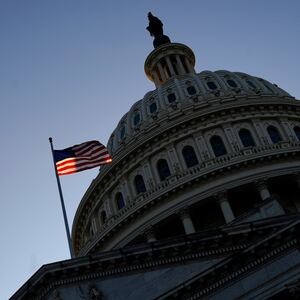It’s the day after Adam Schiff made one last speech on the floor of the House of Representatives arguing that Donald Trump must be impeached. The California Democrat was back at work, headed to the secure room underneath the U.S. Capitol where, over the course of the last three months, his House Intelligence Committee conducted its impeachment investigation.
The inquiry shaped charges that Trump abused his power by pressuring Ukraine to do him political favors and obstructed Congress’ investigation into the alleged abuse—leading to a vote last Wednesday that sealed Trump’s place in history as the third U.S. president to be impeached.
But as Democrats were finalizing the case to have Trump removed from office, Rudy Giuliani, the president’s personal attorney and the man at the center of the Ukraine investigation, gave an interview to the New Yorker in which he admitted he wanted the former ambassador to Ukraine, Marie Yovanovitch, “out of the way” because she was going to “make the investigations difficult for everybody.”
The interview came a week after Giuliani returned from a trip to Ukraine, of which the president told reporters that Giuliani gathered “a lot of good information” and would present a report of his findings to Congress and the Department of Justice.
These developments have weighed on Schiff and fellow House Democrats. As he descended the staircase to his committee’s room—accompanied in that moment not by the usual pack of reporters but only by an aide and a Capitol policeman—this Daily Beast reporter asked the chairman of the Intelligence Committee how his party might navigate this situation.
“I am not sure that I have a complete answer for you,” answered Schiff. “Because, given the continuing nature of his violations of his oath, we have to expect that’s not going to stop. I would hope that the accountability of the impeachment might provide a guardrail, but it could also have the effect of emboldening him.”
“We’ll continue to do our oversight work,” Schiff continued. “That’s all we can do. And if there’s additional wrongdoing, exposing it—that’s all we can do.”
With the Ukraine inquiry complete and the ink dry on their 300-page report on the matter, Democrats find themselves in a complicated position heading into next year. They will retain the oversight power that helped them uncover the scandal in the first place, but they’ll have already exhausted the most powerful available response to what they found—impeachment—and it will almost certainly not result in Trump’s removal. The Republican-controlled Senate is expected acquit Trump on both charges during a trial that will likely take place next year.
Asked how they could meet this challenge, several of the dozen House Democrats who spoke to The Daily Beast for this story gave a similar answer to Schiff: Democrats could only continue investigating—and hope it works out.
“If the president engages in serious misconduct, we have to make a decision about what is the best way to move forward,” said Rep. David Cicilline (D-R.I.), a member of the Judiciary Committee and the first member of House Democratic leadership to back impeachment. “This is the position we’re in. There’s no good outcome other than to continue to call it out, continue to make sure the American people know about it.”
Looking ahead, House Democrats see no shortage of avenues for investigation. They plan, for example, to keep tracking the sprawling and apparently ongoing Ukraine saga, no matter what happens next.
“Rudy Giuliani is running around, trading and bartering, probably, national assets in favor of interference in our election,” said Rep. Jim Himes (D-CT), an Intelligence Committee member. “That story has to be told. We need to understand, even if it’s only sort of in the rearview mirror, so that it never happens again.”
Some lawmakers said that the past year of revelations about the Trump administration was so overwhelming and damaging that Democrats should spend the next year simply surveying the wreckage and figuring out how to rebuild. Rep. John Yarmuth (D-KY) said one of his priorities is “immediate oversight of the Justice Department and the State Department… to see how much damage has been done to those departments, how much credibility they've lost, how much our international diplomatic effort has been damaged, whether there’s still any morale in the FBI.”
In particular, there’s a lot of appetite among Democrats for stepped-up scrutiny on Attorney General Bill Barr, who has declined to testify in front of House Democrats about Robert Mueller’s investigation, or about his considerable role in the Ukraine effort. Some Democrats believe a key part of any post-impeachment oversight should be to ratchet up the pressure on figures like Barr and Secretary of State Mike Pompeo.
Yarmuth said his hope is this strategy “would alert the American people to the damage that’s being done and then hopefully there’s going to be pressure on them to correct it.”
That the 2020 election looms less than a year away creates some challenges for Democrats’ investigations. For one, many of them believe that Trump is still actively trying to use his power to influence his re-election contest. “We’ve got to be very vigilant of continued abuses of office,” said Rep. Ro Khanna (D-CA), “violations in, particularly, the integrity of the 2020 election.”
Democratic lawmakers generally agreed that the goal of their investigations should be to surface relevant information to the public ahead of that election, with the hope that the American people might do what Congress could not: decide that Trump is unfit for office.
“I wouldn’t rule out the possibility that sometime between tomorrow and November of 2020 there's going to be yet more outrageous behavior exposed,” said Himes. “This is the story of the Trump presidency. I mean, every week there are new stories of the president’s immoral qualities… In all likelihood, what matters between now and November of 2020 is the popular sentiment.”
Some Democrats noted that there is technically no double jeopardy for impeachment—in other words, that power could be used again to bring the same or different charges against Trump. But there is virtually no appetite to go there again, unless there are seismic revelations about the president that could shake the ironclad GOP support for him.
“If the president were to do something that in a bipartisan fashion people believe is impeachable then the Constitution doesn’t say you’re limited,” said Rep. Dean Phillips (D-MN), who said he hoped that his GOP colleagues would not simply support the president no matter what. “I’d like to think that, collectively, we still have a system that can prevent tragedies or miscalculations that have unspeakable consequences.”
Other lawmakers noted they could get a bit of help on this front from the courts, which are weighing several cases that could ultimately produce possibly explosive new information about the president.
Decisions from federal judges could come soon, for example, on whether Trump’s former lawyer Don McGahn must testify in front of lawmakers, and on whether lawmakers will get access to additional materials Mueller collected in his investigation. Later in the year, the Supreme Court is poised to issue a hugely significant ruling on whether or not the president’s accounting firm is obligated to release his personal tax and financial records to investigators on Capitol Hill and New York federal prosecutors.
“We have an ongoing responsibility,” said Rep. Madeleine Dean (D-PA), “to continue to follow the investigations that he wholeheartedly, whole-cloth, has blocked. The courts are going to continue to see the obstruction, and the correctness of our cause, and our right to investigate.”
But looking at how the Ukraine allegations developed—on a call between Trump and Volodymyr Zelensky that took place the day after Mueller testified—many Democrats can’t escape the idea another scandal could come from out of nowhere.
Schiff, who on Thursday seemed uncertain whether impeachment would ultimately deter or embolden Trump, did venture one prediction. “I don't think he's gonna feel vindicated,” he said. “But I also don't think he's gonna change his ways.”
Asked if that put Democrats in a tough position, Schiff—before disappearing into the committee’s compound—answered: “It puts the country in a tough position.”







